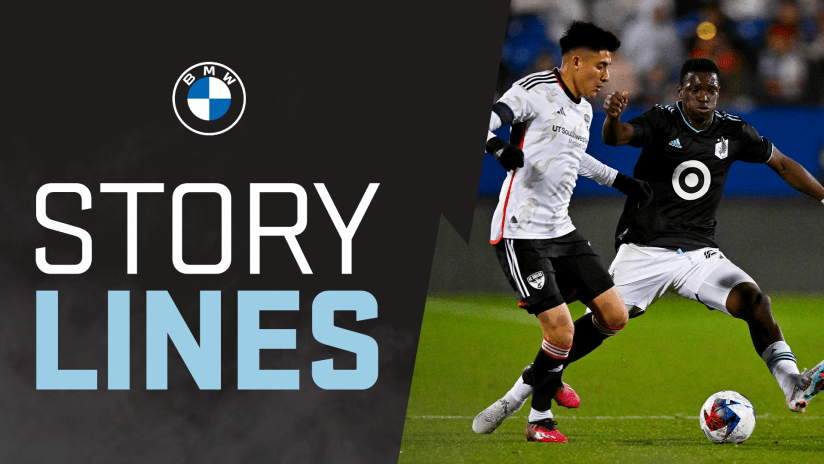Storylines is back and feeling better than ever after the Loons' latest win. After some recent hiccups in the scoring department, MNUFC was able to notch three goals against Detroit City FC on Tuesday. Notably, two of the biggest stars of the night were 22-year-old Emmanuel Iwe, who got his first MLS goal, and 20-year-old Cameron Dunbar, who infused a great deal of energy into the squad. The success of these players is yet another piece of tangible evidence that MNUFC’s quest to build their club around a core of young talent is coming to fruition bit by bit. The Loons’ next opponent, FC Dallas, is well-known for its history of developing young talent and the club offers a different perspective on that similar effort. That’s right, this week’s Storylines is about the youngins.
Minnesota United has taken a multi-faceted approach to building up its young core, simultaneously making long-term investments in its pro-player pipeline while also acquiring talented young players capable of making immediate contributions to the first team.
The club has committed significant resources to its Academy program over the past couple of years, promoting Amos Magee to VP of Youth Development and bringing on board several new coaches including Peter McDonnell, Fanendo Adi, and others. Those investments have already begun to pay dividends on the pitch, with U19 players Carlos Leatherman and Leo Conneh recently earning standout honors while playing regular minutes with MNUFC2.
Meanwhile, MNUFC2 has continued making impressive strides in its second year of existence. Led by head coach Cameron Knowles, the Twos have achieved impressive on-field results in the early part of 2023 while, more importantly, providing a valuable developmental ground for a range of young talent, including Academy grads like Devin Padelford and Fred Emmings, undrafted signees like Molik Jesse Khan and Diogo Pacheco, and first-team contributors like the aforementioned Emmanuel Iwe and Cameron Dunbar.
And of course, most visible of all is the dynamic young corps of talent on display with the first team every week. Over the last 18 months, Minnesota United has acquired Bongokuhle Hlongwane (22), Kervin Arriaga (25), Ménder García (25), and Sang Bin Jeong (21) – an impressive quartet whose speed and play-making ability have already had a major impact for the Loons, with plenty of room for continued upside. Combine that with other talented youngsters, such as Mikael Marques (21) and Ryen Jiba (21), and MNUFC are well on their way to building a pathway for continued long-term success.
On the other side of the table, the FC Dallas Academy is much more established, and many people in the U.S. soccer community would dub them the gold standard. In an ESPN article, U.S. Soccer Sporting Director Earnie Stewart stated, “I think FC Dallas is one of the founders of identifying what development needs to look like, implementing it within their own region and then following through. If you believe in what you're doing, you have to create a place for these players to actually step on the field and play at the highest level within MLS. I think they have proven to a lot of people that this model really works the way they do it."
In proving the success of the Dallas technique, Toros’ graduates played a huge role in helping Gregg Berhalter & Co. qualify for the 2022 FIFA World Cup. Seven former FCD Academy players started in World Cup Qualifying matches: Kellyn Acosta, Reggie Cannon, Jesús Ferreira, Weston McKennie, Shaq Moore, Ricardo Pepi, and Chris Richards. On top of that, 29% of USMNT’s goals during qualifying and 33% of the assists were produced by FCD Academy grads.
Of the 26-man squad that actually appeared in Qatar, three of them were Dallas Academy products – Weston McKennie, Jesús Ferreira, and Kellyn Acosta. In an interview with ESPN, the former U.S. under-20 coach Tab Ramos specifically recalls how much talent FCD was producing in the years leading up to Qatar. "I remember being the youth technical director at U.S. Soccer and we were all saying, 'Wow, Dallas is where all of the players are coming from, or most of them.’”
MNUFC may not quite have reached the same level of youth team success yet, but the club has made major strides since joining MLS in 2017. The pro-player pipeline is forming wonderfully, and many younger players are given the opportunity to develop their skills in highly competitive spaces. Just a few weeks ago the U15 and U17 Academy teams participated in the Generation adidas Cup, and the squads had the opportunity to compete against talented international teams – performing well and earning final records of 3-4 and 4-3, respectively. There have been many examples of initial success with Minnesota’s model, and there is plenty of room to grow from here.
It is exciting to think about the youth movement in the U.S. right now. The success of Dallas proves that as more clubs focus on building from the ground up, the well of American talent will continue to grow deeper. As Minnesota puts more energy into growing its Academy, it is not a wild thing to think that in the upcoming years, it just might be MNUFC sending multiple players to the USMNT. The future is with the kids of today, and the building blocks are being set to ensure that the next era of U.S. soccer will be dynamic, competitive, and brimming with triumph.
Up Next:




